Speech analytics as a tool for managing KPI contact center. Case "Rostelecom"

Today we will talk about how Rostelecom North-West raised the business indicators of its Single Contact Center (ECC) with the help of innovative speech analytics technologies. The results of a consulting project were summed up, in which the MDG specialists, using Speech Analytics Lab speech analytics tools, analyzed customer requests to Rostelecom ECC and suggested a methodology for improving the quality of service.
Why do we need speech analytics in CC?
The ECC of the North-West branch of Rostelecom is a huge system that processes thousands of requests every day. During quality control, supervisors can analyze only a random sample of calls, which, as a rule, amounts to 2% of the total number of calls. And this does not always give an objective picture.
')
With the help of speech analytics tools, experts can work with 100% of hits. To do this, all ECT dialogues are translated into text and analyzed using the Speech Analytics Lab system. Thanks to the search tools in arrays of unstructured speech information, the analyst can work out hypotheses (find keywords) on samples of hundreds of thousands of phonograms in a few seconds.
On the basis of such an analysis, it is possible to develop a program of changes for the procedures and processes existing at the ECT and to optimize the self-service systems (IVR, My Account, website).
Speech analytics tools allowed to solve problems that inevitably confront large contact centers: increasing company revenues by increasing sales efficiency, reducing costs by increasing productivity and reducing redundant contacts, increasing customer satisfaction with services.
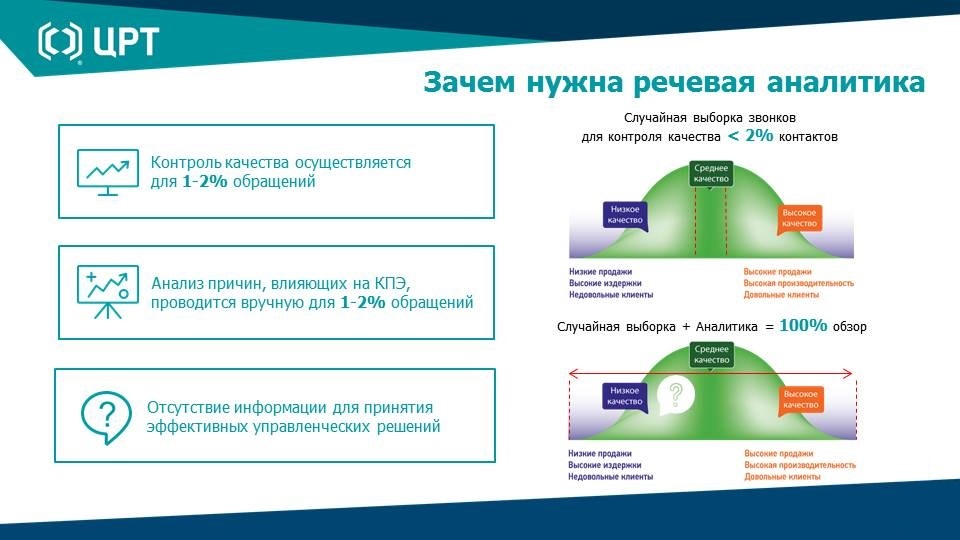
The purpose and objectives of the project
The aim of the project was not only to increase the operational and financial efficiency of the ECC, but also to develop and update a methodological description of the quality control and management processes of the ECC development zones.
For each direction of work of the ECC, its task was to raise the indicators.
Hot line:
- reduce non-core load and increase sales efficiency
Technical support:
- reduce the number of repeat requests
Information and Reference (ISO) and Settlement Service (RSO):
- reduce the average service time and increase automation
Application of speech analytics in the contact center
In the course of the project, our specialists analyzed more than 1.4 million hits on 12 service areas of the ECC. According to the results of the work, the ECT leadership monthly received detailed information on the size of the identified development zones in the chosen direction and recommendations on a corrective action plan. Changes were made to work with specialists, scenarios, tutorials, IVR scenarios.
The duration of the project allowed to re-analyze the main areas, explore the dynamics of changes in the detected growth areas, according to the facts of non-compliance by the staff of the service regulations, identify new areas of growth and adjust the recommendations.
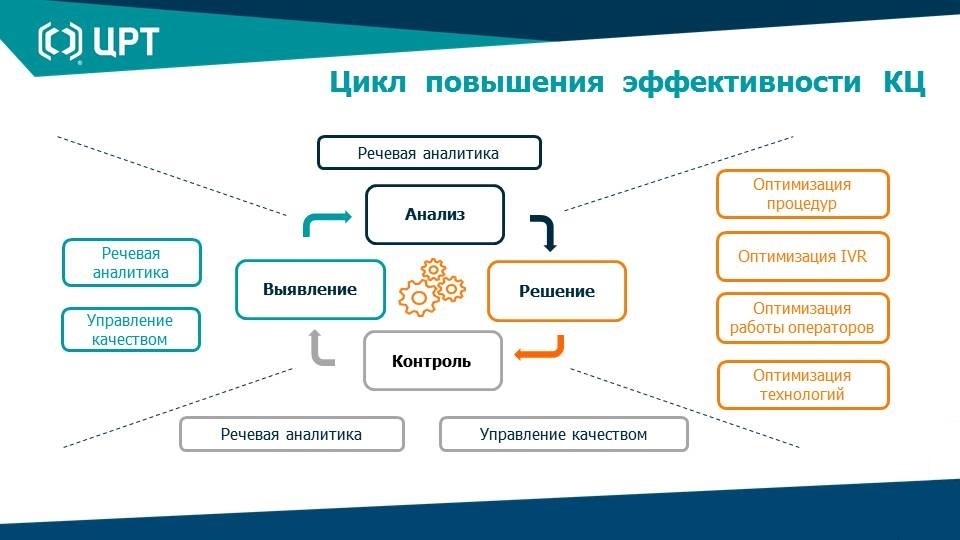
Reduced average service time
To reduce the average service time (ITS), first you need to answer a few questions: what topics have customers been talking to with operators the longest? What questions are they asking? What topics cause trouble for employees? In which cases the client can solve the issue on his own using self-service: IVR, personal account or website?
The analysis of appeals helped to identify topics in which the client can resolve the issue on his own, without contacting the ECC. Following the results of analytics, the procedures for customer service were changed: on issues in which this was necessary, promotion of self-service services was added.
Speech analytics helped to effectively and efficiently build hypotheses to solve the problem. For this, such tools were used as a separate analysis of client and operator speech, analysis of lexical statistics (the most frequently used words or phrases), the ability to specify the distance between words in the phrase when searching, combine keywords for the search with logical operators "AND", "OR" , "NOT" - and many others.
The system of recording and automatic quality control of the Smart Logger II also allows analyzing the speech characteristics of the dialogue: the proportion of operator / client speech, the duration of silence,% simultaneous speech,% silence, and others. To work on reducing SVR, reporting on a number of parameters was unloaded from the system: the duration of the dialogues, the duration of the hold time, and the duration of silence. Based on the results, the staff worked on developing dialogue skills.
Finding out on which issues customers most often turn to the ECC, and on which topics they talk the longest, we were able to give recommendations on how to refine the self-service services.
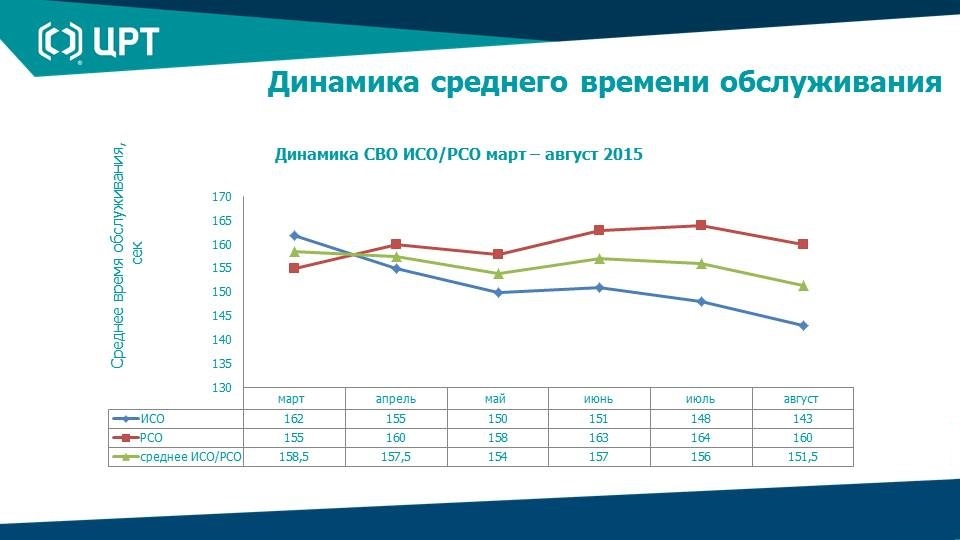
As a result, from March to August, the NWO in ISO decreased by 11.73%, and in the whole in ISO and NOR - by 4.42%.
Unloading technical support
To optimize repeat calls, topics were identified and the reasons for such calls were analyzed, typical operator errors were recorded, and employees were identified - “repeat call generators”. Subsequently, specialists in the Quality Control Direction carried out targeted work with operators on the identified development zones.
When contacting technical support staff often recommended the client to reboot the equipment and call back. Naturally, this increased the number of repeat hits. Therefore, a message about the need for a reboot was added to the IVR, so that the client could do it in advance, immediately after “communicating” with the voice assistant, and solve his question in one call to technical support. Operators were advised to wait with the subscriber to restart the equipment.
Often, customers with debts who were “turned off for non-payment” applied to technical support regarding non-working services. In this regard, the IVR added the ability to find out the balance on their own, without waiting for the answer of the expert. Also, additional opportunities for independent solution of technical issues were added to the site. As a result, over the month, the number of repeated requests for the North-West macroregional branch as a whole decreased by 4.77%, and in Komi - by a record 18.37%.
Improving sales efficiency on the hotline
To increase sales efficiency, the analysis was carried out at the level of consultants and regional branches. Experts have identified the main errors of the operators of the hotline: violation of the sales scenario, including the absence or incorrect work with objections, communication errors.
Speech analytics tools allow you to limit the scope of a keyword search in seconds or the number of words before or after certain words or expressions. This makes it possible to analyze what the expert says and, therefore, the specialist does after the failure or latent refusal of the client to activate the service. You can also analyze how quickly he fulfills objections.
For example, in order to analyze the operator’s work with refusals and objections, the client’s speech was searched for keywords indicating a failure (“not needed”, “expensive”, “not interested”, etc.), as well as a hidden failure (“ I will think "," I will consult ", etc.), then the operator’s speech was analyzed in the next 50 words. This allowed us to understand how the operator owns and manages the dialogue, and whether he uses the script or his own unique sales practices.
Also, the Speech Analytics Lab functionality allows you to analyze lexical statistics on several sets of text transcripts: common words for the samples or unique to a specific sample. This tool is used to work with the best and worst practitioners: analysts compare the sample in which the sale took place and did not take place.
The project was able to identify operators who need additional training. And also explore unique sales practices that can be replicated for inclusion in scenarios and training programs.
As a result of the project, sales of incoming telemarketing at the ECC increased by 22.5%.
We also managed to reduce the non-core load on the Incoming telemarketing line by 14%. After analyzing non-core treatment, identified development zones. The main directions here were the optimization of IVR and work with impaired specialists.
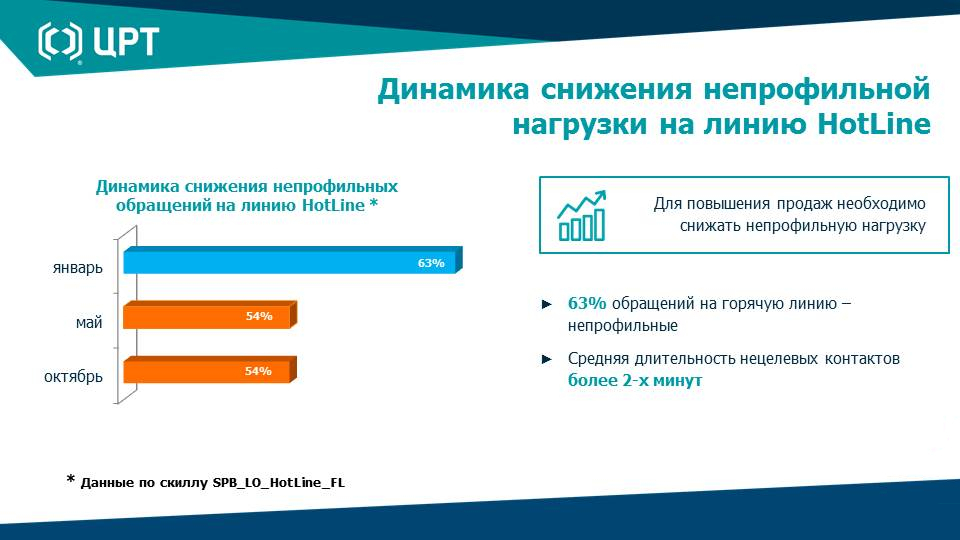
Improving the efficiency of outgoing sales
Also in the course of the project, we worked with outgoing telemarketing requests.
To identify the best sales practices, we separately analyzed the dialogues in which the sale took place. An in-depth analysis of the speech of specialists was carried out: the dialogues in which the operators observed the script were distinguished, as well as the cases when they used unique techniques. Here, analysts used the tools of lexical statistics (the most common words and phrases), graph construction, speech analysis for limited search areas, etc.
For example, speech analytics revealed a previously unknown development zone: when the client refused the offer (“not ready”, “not interested”), the operators quite often did not try to work with objections, but to say goodbye to the client, ending the conversation.
We found this out by working with the dialogue analysis tool, which allowed us to analyze a limited area of the dialogue - the speech of a specialist within 5 words after the sounded client’s refusal.

Select the conversations in which the client refuses (look for the channel "client")

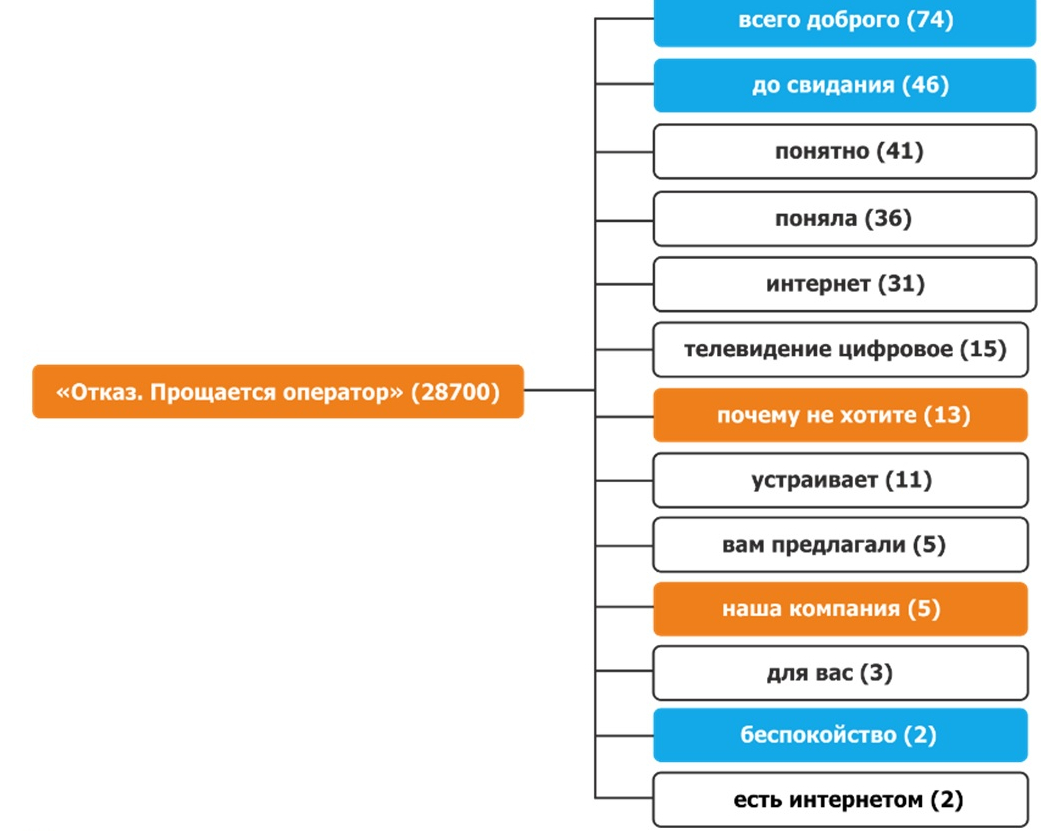
Check how the operator worked, limiting the search area to five words following the failure
Thanks to the directional work of Rostelecom specialists, it was possible to significantly increase the indicators of compliance with the scenario.
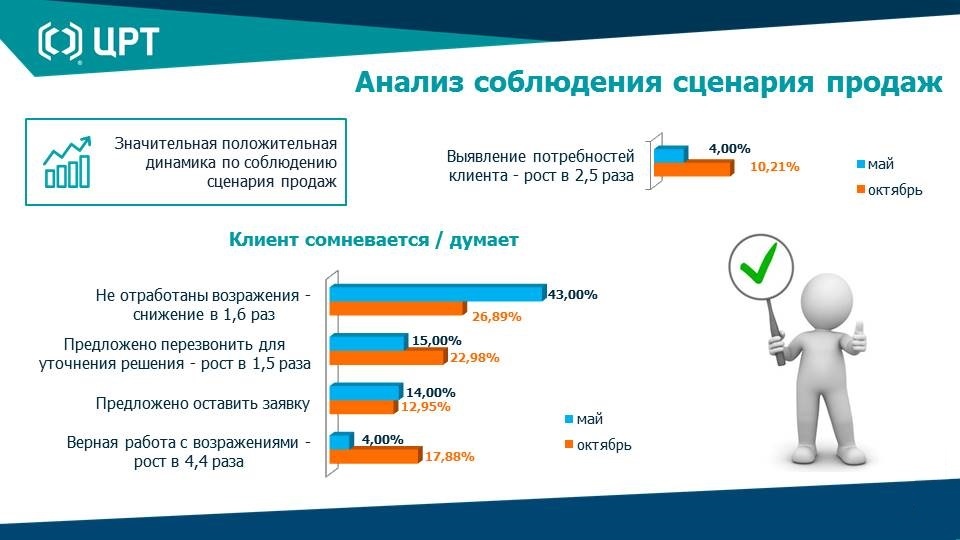
Improving the quality of service in the Sales Support Center (Installation Coordination Department, Installation Workshop)
As a result of the analysis, service violations and employees who do not adhere to the scripts and service standards at the ECC were identified. Our analysts have prepared recommendations and statistics on the employees with whom we need to work.
The specialists of the ECF MYFF "North-West" conducted additional training on the identified growth zones, development of customer-oriented approach to service skills, and training on service standards.
Project results
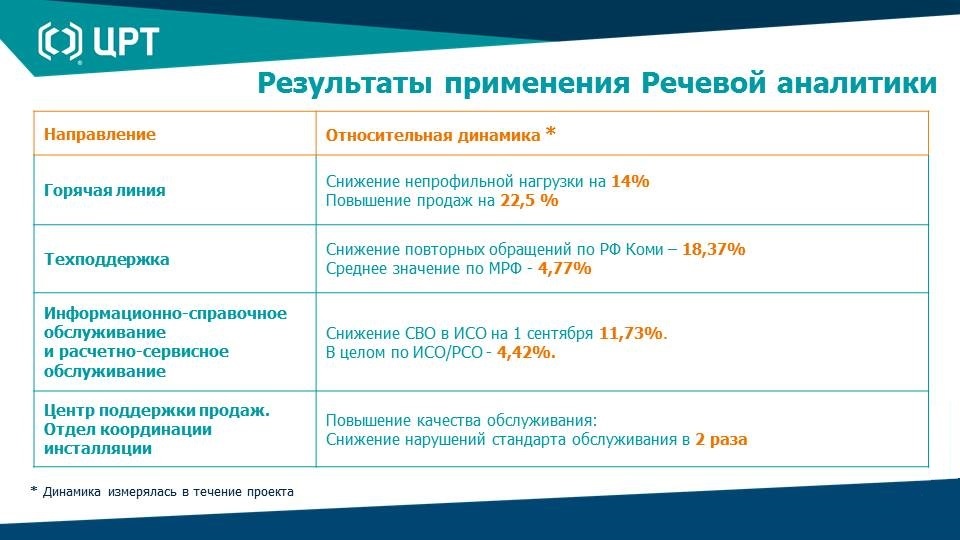
Thanks to the joint productive work of the MDG teams and the ECC branch of Rostelecom:
- On the line of incoming telemarketing - a decrease in non-core load by 14% and an increase in sales by 22.5%
- On the first line of technical support - a decrease in repeated calls by 5%, and, for example, in the Komi regional branch - by 18.5%
- In the information and reference direction, the average service time is reduced by 11.73%
- In the coordination department of the installation of the Sales Support Center - a 2-fold increase in compliance with the service standard
The results obtained once again proved the applicability and effectiveness of speech analytics tools and techniques for solving problems of large contact centers. And Rostelecom specialists received an updated methodology for quality control and management of the ECC development zones.
Links
News on Rostelecom website
Source: https://habr.com/ru/post/311790/
All Articles